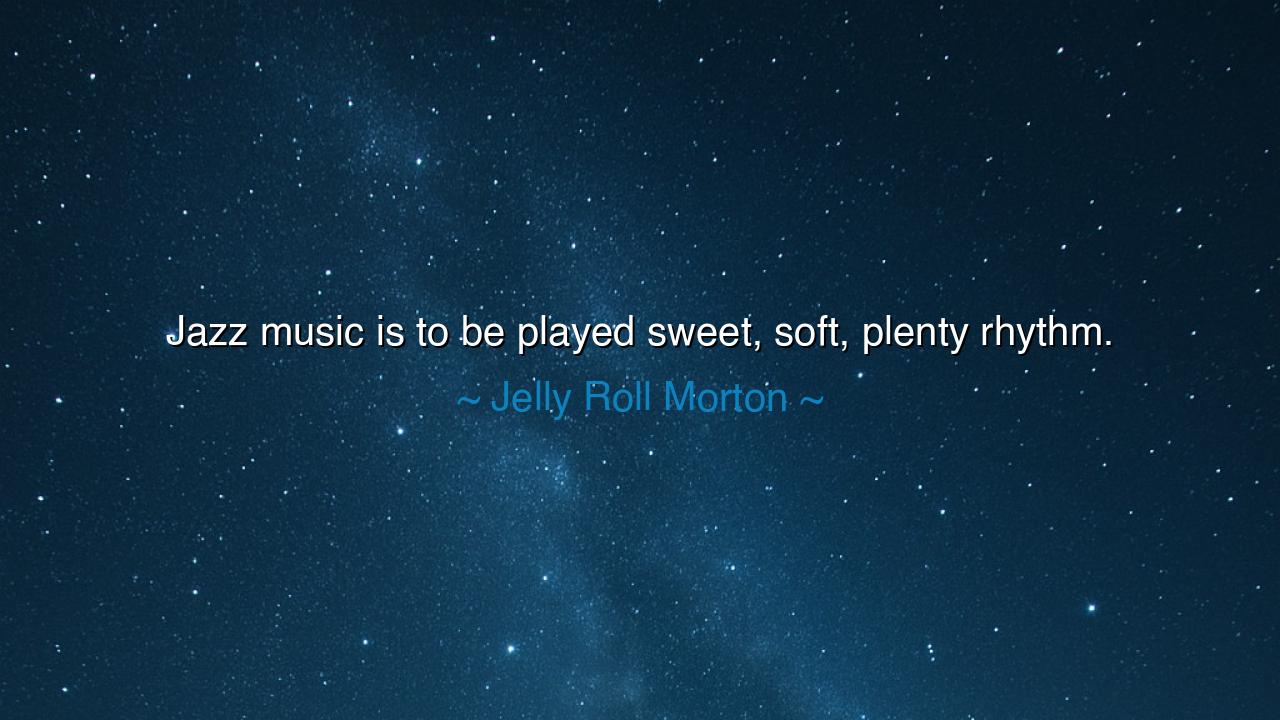
Jazz music is to be played sweet, soft, plenty rhythm.






In the words of Jelly Roll Morton, master of the keys and father of early jazz, we find this teaching: “Jazz music is to be played sweet, soft, plenty rhythm.” These words are not mere instructions for musicians; they are a philosophy of life, a lantern passed down from one age to the next. To play sweet is to pour gentleness into sound, to remember that even in the chaos of the world there must be tenderness. To play soft is to cultivate humility, knowing that true power is often carried not in the shout but in the whisper. And to play with plenty rhythm is to honor the eternal heartbeat, the pulse that binds earth to sky, body to soul, man to man.
Consider the word sweet. It is not sweetness as in sugar alone, but sweetness as in compassion, kindness, and the ability to soothe wounds. In jazz, sweetness tempers the rough edges of improvisation. In life, sweetness tempers the harsh blows of fate. A melody, when played with sweetness, reminds the listener of the tenderness of a mother, the smile of a child, or the softness of a night breeze. Without sweetness, music becomes noise; without kindness, life becomes suffering. Jelly Roll Morton, though bold and fiery in character, understood that no music endures without sweetness at its core.
Now let us dwell upon softness. Many confuse softness with weakness, but it is not so. The soft water shapes the hardest stone, the gentle hand restrains the fiercest beast. To play jazz soft is to let silence breathe between the notes, to know restraint, to allow space for others to join. In our lives too, we must learn softness: to listen before speaking, to forgive when wronged, to bend rather than break. The ancients remind us that the oak, stiff and proud, may be toppled by the storm, but the reed, soft and pliant, survives. So too must we learn softness.
But then comes plenty rhythm, the heartbeat of all things. Without rhythm, jazz is lifeless; without rhythm, our days are chaos. Rhythm is discipline hidden within freedom, order concealed inside play. Jelly Roll Morton’s rhythm was not mechanical, but alive—syncopated, unpredictable, yet always returning to the heart. Rhythm is the march of time, the flow of seasons, the balance between work and rest, struggle and joy. To live with rhythm is to align oneself with the eternal drumbeat that underlies creation.
History itself offers witness to these truths. When Louis Armstrong, still young, played under the tutelage of King Oliver in New Orleans, he learned not just to blow his horn loud, but to shape it with sweetness and softness, always grounded in rhythm. His notes could pierce the heavens, yes, but they also carried laughter, tears, and the dignity of his people. In the rhythm of Armstrong’s horn, one could hear not just music, but the story of a race rising from sorrow into joy. And so, the lesson of Morton lived on through Armstrong, and through countless others who dared to play not only with skill, but with soul.
The wisdom here is not for musicians alone. It is for all who live. For are we not each players in the great orchestra of time? Each man and woman holds an instrument—the voice, the hands, the heart—and each must choose how to play. Shall we play harsh and unyielding, or shall we play with sweetness? Shall we insist upon our own noise, or shall we play softly so that others may be heard? Shall we stumble without rhythm, or shall we walk in harmony with life’s beat?
Thus, let the lesson be clear: to live well is to live like jazz—sweet, soft, and with plenty rhythm. Sweetness in compassion, softness in humility, rhythm in discipline. Practically, this means: offer kindness daily, even when the world offers bitterness. Speak gently, even when anger tempts you to roar. Establish rhythms in your life—time for work, time for rest, time for reflection—so that you may not be lost in chaos. Seek harmony, not only in music, but in your dealings with others.
And so, children of the future, take up this teaching. Let Jelly Roll Morton’s words be carved not upon stone tablets but upon your very heart. Play your life like jazz: sweet so that others may taste hope, soft so that others may breathe, and rhythmic so that your steps carry you steadily forward. In this way, your days will not merely pass—they will sing.






AAdministratorAdministrator
Welcome, honored guests. Please leave a comment, we will respond soon